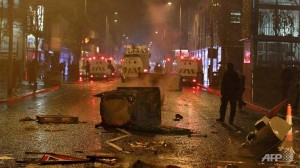
Belfast (AFP) – Police in Northern Ireland fired plastic bullets and a water cannon at protesters in the capital Belfast late Monday after coming under a hail of petrol bombs, bricks and stones for a fifth night.
Rioters in the east of the city used weapons including hatchets and sledge hammers to attack police and their vehicles, the Police Service of Northern Ireland (PSNI) said.
Pro-British protesters have taken to the streets of Belfast almost every night since 3 December, when the city council announced that it would no longer fly the British flag all year round at the City Hall.
The decision sparked riots at the start of December which gave way to largely peaceful protests, but the violence has flared again since the start of the new year.
Britain’s Northern Ireland minister Theresa Villiers said the province was being “held to ransom” by the protesters and called for an end to their demonstrations, including peaceful rallies that have blocked traffic for weeks.
“It’s not acceptable that those who say they are defending a Union flag are actually doing it by hurling bricks and petrol bombs at police. It’s disgraceful, frankly,” she told BBC radio.
She added that the protests were doing “huge damage to Northern Ireland’s image abroad.”
The flag ruling has raised tensions in the British province between loyalists, who want to maintain the links to Britain and are mostly Protestant, and largely Catholic republicans who want a united Ireland.
Northern Ireland’s chief police officer Matt Baggott on Monday accused the paramilitary Ulster Volunteer Force, which murdered more than 500 people during the province’s 30-year sectarian conflict, of whipping up the disorder.
“Senior members of the UVF in east Belfast as individuals have been increasingly orchestrating some of this violence,” he told a press conference.
“That is utterly unacceptable and is being done for their own selfish motives.”
On Monday, police battled to separate a crowd of around 250 loyalists from some 70 Catholic republicans, who hurled missiles including bottles at the protesters.
Around 1,000 loyalists had earlier staged a peaceful demonstration outside the City Hall as councillors held their first meeting since their decision to take the flag down.
More than 60 police officers have been injured and over 100 people arrested since the disorder began at the start of December.
The PSNI said four people had been charged in connection with Monday night’s disorder and were due to appear in court on Tuesday.
Politicians from both sides have received death threats in recent weeks, but lawmakers from all major parties have insisted that the spate of violence does not pose a serious threat to Northern Ireland’s peace process.
Some 3,000 people were killed in the three decades of sectarian bombings and shootings in Northern Ireland known as “The Troubles.”
A 1988 peace agreement brought an end to most of the violence and led to the creation of a power-sharing government between Protestants and Catholics, but sporadic bomb threats and murders by dissident republicans continue.
Loyalists see the council’s decision to remove the flag for most of the year as an attack on their British identity and an unacceptable concession to republicans.
The flag will only be flown on a maximum of 17 designated days including the birthdays of members of the British royal family; the first of which falls on Wednesday with the birthday of Prince William’s wife Catherine.
Across the border in the Republic of Ireland, police are assessing the risk posed by a planned loyalist protest against the flag ruling in Dublin on Saturday.
The last major loyalist demonstration in the Irish capital sparked rioting and looting in 2006.


